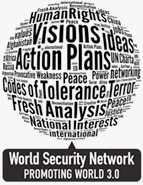The New Art of Peacemaking: Let's Make Friends First — Use Arms only as an Ultima Ratio Regis

Hubertus Hoffmann: The Art of Peacemaking in Iraq and Afghanistan is not working very well at the moment—why not?
Klaus Reinhardt: The cooperation between military and civilian agencies is not well run and lacks coherency in its coordination. The international community can ultimately only win in Iraq and Afghanistan when they not only support weak governments and fight the enemy militarily, but win over the population to their side. There are enough financial resources for both countries, what is lacking is a coordinated military and political comprehensive strategy. We have to make friends in peacemaking! The local population must experience in their daily lives that they are better off now than they were before: if we can't achieve that, we will always lose. The calls for more soldiers won't help then.
Hubertus Hoffmann: Could you give an example, for instance in Afghanistan?
Klaus Reinhardt: In Afghanistan, opium is produced with a value of $2.7 billion per year, of which only $560 million reaches the farmers. Why doesn't the West put up that manageable sum and buy the opium harvest for two years, and then use it for the production of medicinal opiates? Why don't we organize a viable alternative to poppy cultivation and then pay the farmers an appropriate amount for the alternative, for example, rose essence? Instead, we deliver wheat within the context of humanitarian aid, which used to be widely cultivated in Afghanistan, and in such amounts that it is in turn exported. It makes no sense.
16,000 police were trained by German police officers in Afghanistan, of which an innumerable amount have deserted and now work for the warlords because they pay three times as much the Government of Afghanistan. Where is the money for an appropriate salary for the police? Actually, after several years of U.S. and NATO presence in their villages, the population should have experienced by now that they and their children are better off than they were under the Taliban. In the South, many see just the opposite. Until now, one has seen only soldiers and bombs raining down upon their villages for the last years—that only produces enemies and bitterness. Civilian aid was minimal and too weak. With this, the ground was prepared upon which the Taliban operates today. Shoot only as a last option! The West must win over the hearts and minds of the people with development aid and friendship, and thereby making friends out of potential enemies.
Hubertus Hoffmann: Are there any good examples of this?
Klaus Reinhardt: In Iraq, the Commander of 101st U.S. Airborne Division, Major General Petraeus, operated with great success in the area around Tikrit through his priority of reconciliation and civilian assistance, rather than military operations only. The same is true for, Major General James Mattis, the Commander of the 1st U.S. Marine division. And just a few weeks ago, in southern Afghanistan, the British negotiated local peace agreements with the clanchiefs, thereby realizing the first requirements for peace.
Hubertus Hoffmann: Do the Americans now think more politically and less militarily?
Klaus Reinhardt: Two ex-National Security Advisers, Samuel Berger and Brent Scowcroft, have, in a remarkable study, called for a new priority for the U.S.A. in the area of civilian and military cooperation (“In the Wake of War”). The political arena must have priority, not the military. Both politicians demand, therefore, that prior to every operation—not simply afterward—a precise definition must be formulated of what one wants to and must achieve in the area. To this end, one needs a civilian and military comprehensive strategy cast from one mold. Instead, the U.S.A. went into Afghanistan and then Iraq, at first militarily, and has for many years neglected a close and successful integration of civilian and military aspects.
Hubertus Hoffmann: What were your experiences in Kosovo as the Commander of the International Peace Force KFOR in the period between 1999 and 2000?
Klaus Reinhardt: The population in Kosovo waited for seven years for things to improve under NATO and now the EU—now they are becoming upset and disappointed. After seven years, 75% of 20–30 year olds are unemployed. Why? There is economic standstill. No one invests in Kosovo because the question of the political legal status has remained unanswered for too long and foreign investors don't know whether Kosovo will remain part of Serbia or will become independent.
The fundamental principle has to be: after an external intervention, the population must always be better off than they were before.
The second rule is: more rapid and very concrete aid locally. The EU coordinates almost all decisions pertaining to Kosovo from Brussels—a long way off.
Thirdly: a close daily communication must be maintained between the civilian coordinator of the United Nations and the military Commander, which my political counterpart, Bernard Kouchner, and I continually and successfully strived for.
Fourthly: the military is only a supplemental service provider for civilian construction, not the other way around. Its task is primarily to provide internal and external security upon which political structures can be built and the economic foundation for the population secured. The policy of reconstruction and reconciliation has priority.
Canons must always remain the “Ultima ratio regis”—the final option of all political options—as was wisely cast for all soldiers to see on all of the canons belonging to the famous Prussian king Friedrich the Great.
In the Wake of War: Improving U.S. Post-Conflict Capabilities








Comments